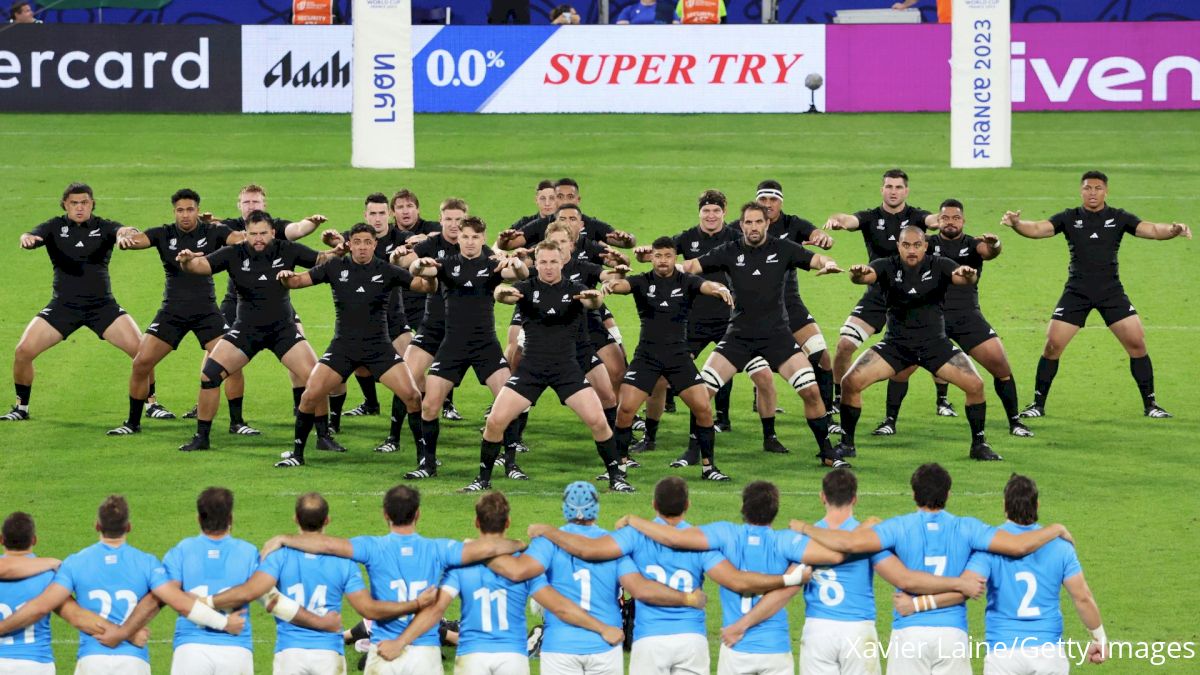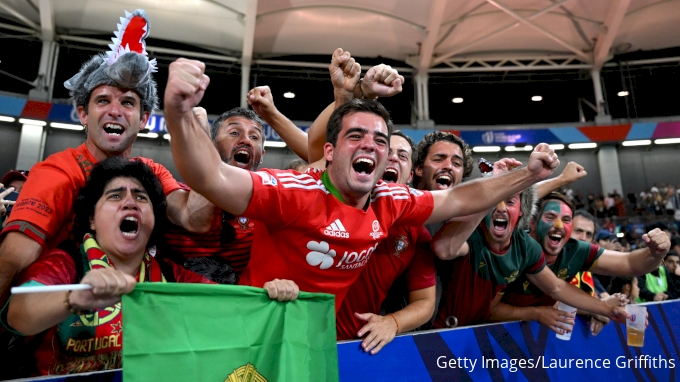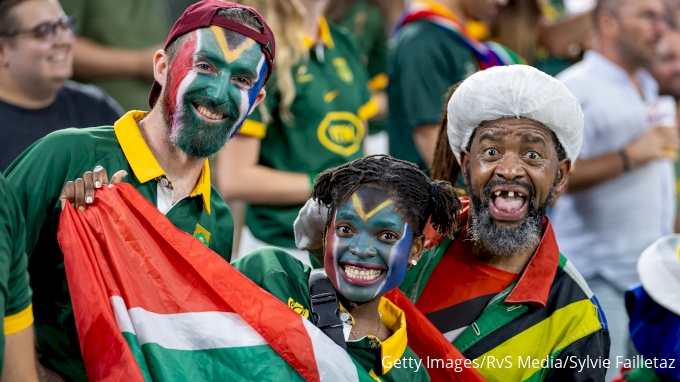Rugby World Cup Pool Stage Review - Exciting International Growth Evident
Rugby World Cup Pool Stage Review - Exciting International Growth Evident
Explore the Rugby World Cup pool stage – witness international growth in rugby as teams showcase their prowess at global tournament.

Like a shooting star in the night, the pool stage of the 2023 Rugby World Cup has been and gone.
Forty matches of high-octane test rugby, as expected, delivered some exceptional moments that will live long in the memory of fans the world over.
Starting with the host France handing the mighty New Zealand All Blacks their first pool-stage loss on opening night, the tournament progressed toward a remarkable ending, as Portugal defeated a quarterfinal-bound Fijian side for a historic first victory at a Rugby World Cup.
With so much to unpack, here are five of the biggest takeaways from this year’s Rugby World Cup pool stage.

Tier 2 In Name Only
Starting on a positive of note, as touched upon above, Portugal was sublime throughout this year’s tournament.
The team grew from week to week as it pushed two of rugby’s traditional powers in Wales and Australia, before earning a draw with Georgia.
All of this was laying the building blocks for the pièce de resistance, which was the victory over Fiji.
While Portugal undoubtedly was the Tier 2 story of the tournament, fellow emerging nations Uruguay and Chile proved without doubt that they belong at the game’s top table.
How this looks in reality remains to be seen, given the rise of the likes of Georgia, Fiji and Japan in recent years.
For a full, deep dive into what would need to happen for this team to take the step up, read here.
In short, the spirit shown by the so-called minnows of World Rugby was a pleasure to witness, and this must be capitalized upon, if the game is to continue its growth.
Quarterfinals Confirmed
With the quarterfinals now upon us, the stark reality of knockout rugby dawns for the tournament’s top eight teams.
Getting us underway Saturday afternoon will be Wales and Argentina, who will clash in what will be an interesting clash of styles.
Five hours later, in the night skies of Paris, two tournament favorites in Ireland and New Zealand will meet in what no doubt will be a fiery clash between two bitter rivals.
With two semifinalists confirmed, England and Fiji will reacquaint themselves following the South Pacific Islanders' historic pre-World Cup victory at Twickenham Stadium.
Closing out the weekend, reigning world champion South Africa will look to spoil the party, as they take on France in what is a mouthwatering fixture.
In full, the quarterfinals will be as follows:
Wales vs. Argentina – Marseille – kickoff: 4pm local time
Ireland vs. New Zealand – Paris – kickoff: 9pm local time
England vs. Fiji – Marseille – kickoff: 4pm local time
France vs. South Africa – kickoff: 9pm local time
Here our your top try scorers so far 🔥#RWC2023 | #GameChangers | @Capgemini pic.twitter.com/Q5AmTGbatf
— Rugby World Cup (@rugbyworldcup) October 9, 2023
Ludicrous Draw Ages Like Milk
Undoubtedly, the hot topic coming into this year’s tournament was the 3-year-old draw that saw the five top-ranked teams cramped into Pool A and Pool B.
Thus, the reality that one of the best teams in the world would be sent packing before the quarterfinal stages left an uneasy feeling in the Rugby World.
Unfortunately for Scotland, it always was the most likely to have the campaign ended early.
This prospect became ever more likely when Scotland lost its opening match to the reigning champion Springboks.
Two big scores against Romania and Tonga ensured the Scots had a pulse heading into their final clash against Ireland. Unfortunately for Gregor Townsend’s side, they met an absolute buzzsaw Irish side that carved them open in the first minute.
In the end, a 36-14 loss would see their World Cup dreams come crashing down in hideous fashion.
In reality, had Scotland been in either Pool C or D, the likelihood of the Scots topping their group was very real.
As Townsend and his charges pick up the pieces on a second successive pool-stage exit, the top 4 will be reduced to two as the quarterfinals roll on.
Realistically, the two evening matches should have been semifinals this year. Instead, four teams that are not just a step below the top teams, but multiple steps behind, will play out two other quarterfinals.
As such, the semifinals should prove to be far less competitive than the quarterfinals in a rather bizarre twist.
It will come as a true shock if the final is not contested by two teams from Pool A and B. As such, the question must be asked: why was the draw done so far out? And how could it not have been adapted a year ago to be a true reflection of the current global rugby landscape?
Who makes it all the way?#RWC2023 pic.twitter.com/vVjUwCK3UZ
— Rugby World Cup (@rugbyworldcup) October 8, 2023
Unrivalled Fan Experience
Head-scratching draw aside, this year’s tournament has been a world-class spectacle and, more importantly, a true celebration of our beautiful oval-ball game.
The key to this has been the fans, who have proven once again why they are the best of any sport.
Witnessing the camaraderie first-hand, the basis of the game remains clear for all to see. Rugby remains a sport of respect, friendship and banter.
Supporters from all over the world descended on France, and outside of the rather unorganized stadium bars, the tournament has gone off without a hitch. Throw into the mix World Rugby's exceptional Fantasy Rugby game and the various fan experience zones, and it becomes abundantly clear that the tournament has been, and continues to be, a great reflection of the international game.

Expansion Needed
Building on the above point, outside of the blowout scores, it is clear the tournament must expand.
For North American fans, the disappointment of both Canada and the USA failing to qualify was a devastating setback for the sport.
Hosting the 2031 tournament, the USA will need to show significant growth before the game descends on its shores.
The positive news is that, as Japan showed in 2019, it is infinitely possible to do this, provided the right structures are in place.
Aside from the North American teams, European teams such as Spain, Holland, Germany, Belgium and Switzerland continue developing.
In Africa, Kenya, Zimbabwe, Uganda and Cote D’Ivoire all have shown glimpses, whether it be on the sevens circuit or in the past, of what they would bring to the tournament.
Joining their South American brethren, it would be exciting to watch the game continue its growth in Brazil, while the Caribbean nation of Jamaica has shown growth in the world of sevens, too.
Finally, in the Asia Pacific region, Papa New Guinea and the Cook Islands have untapped potential, many of whom are playing in Australia’s National Rugby League competition.
Hong Kong and Korea are ranked in the top 30 of the world rankings and have a strong rugby history.
While it is clear there is no magic wand to bring these nations up to scratch overnight, the prospect of featuring at an expanded Rugby World Cup certainly would aid the process.